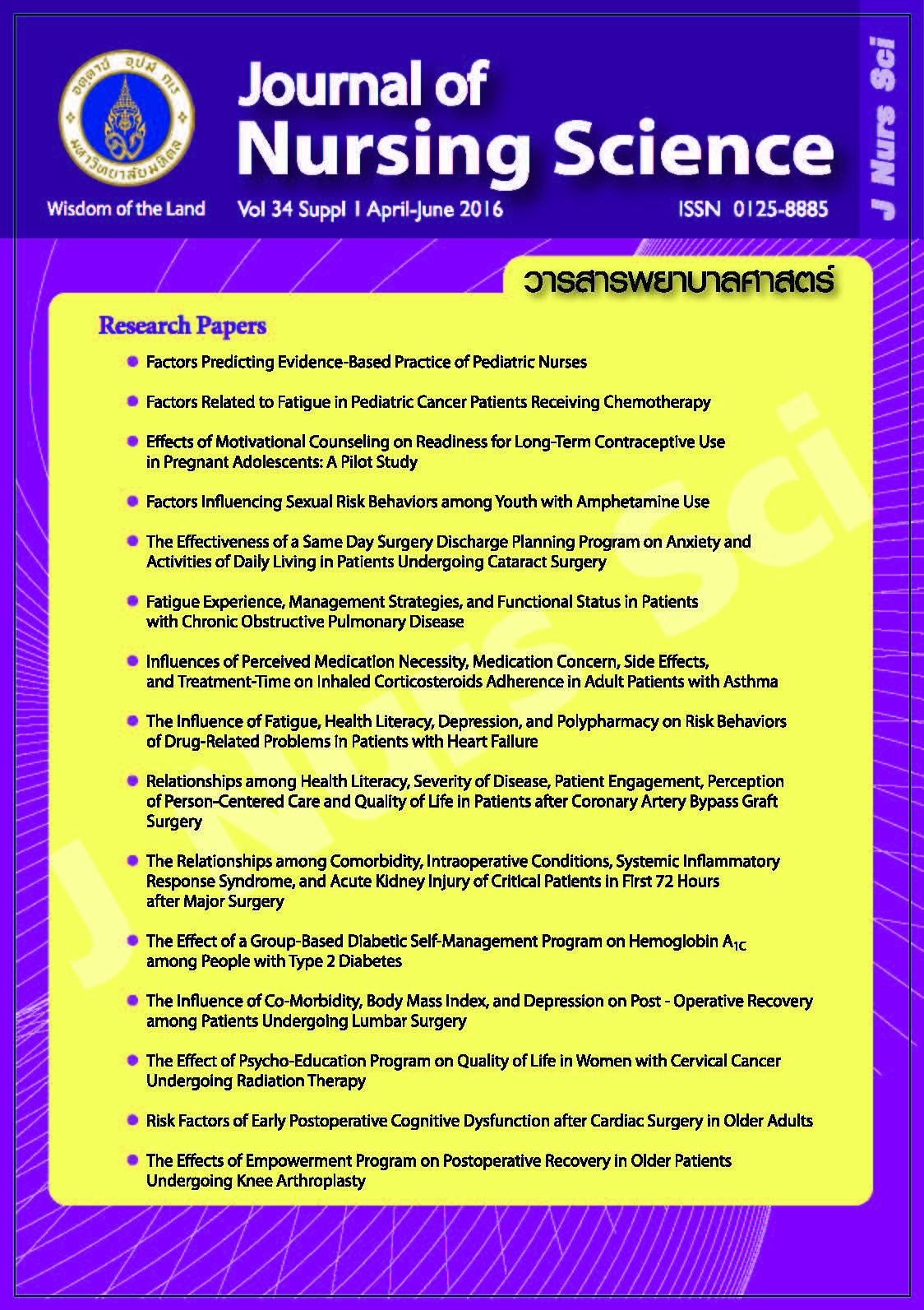Risk Factors of Early Postoperative Cognitive Dysfunction after Cardiac Surgery in Older Adults
Main Article Content
Abstract
Abstract
Purpose: The present study aimed to investigate risk factors of cognitive level, postoperative pain, dose of opioid, postoperative delirium, and quality of sleep for the incidence postoperative cognitive dysfunction in older adults undergoing cardiac surgery.
Design: Descriptive correlative design.
Methods: The sample consisted of 113 older adults aged 60 years and older who underwent open heart surgery at three tertiary hospitals, in Bangkok Metropolitan. Data were collected with the personal data record form, the Mini Mental State Examination (MMSE-Thai 2000), the postoperative pain scale, the opioid intake assessment, the sleep questionnaire, the Thai version of the Confusional Assessment Method and the postoperative cognitive dysfunction assessment. Data were analyzed by percentage, mean, standard deviation, and logistic regression.
Main findings: The study findings revealed that 27.40% of the subjects suffered early postoperative cognitive dysfunction. Logistics regression analysis revealed that impaired cognition, a moderate level of pain, dose of opioid and postoperative delirium significantly increased the risk of early postoperative cognitive dysfunction (p < .05).
Conclusion and recommendations: Healthcare personnel should utilize the study findings to ensure readiness before the surgery by assessing cognitive function, pain, use of opioid, and postoperative delirium to reduce the impacts and severity of postoperative cognitive dysfunction in
older adults undergoing open heart surgery.
ปัจจัยเสี่ยงต่อการเกิดภาวะการสูญเสียหน้าที่ด้านการรับรู้การเข้าใจหลังการผ่าตัด ในผู้สูงอายุที่ได้รับการผ่าตัดหัวใจ
บทคัดย่อ
วัตถุประสงค์: การศึกษาครั้งนี้มีวัตถุประสงค์เพื่อศึกษาปัจจัยเสี่ยง คือ ระดับการรู้คิด ความปวดภายหลังการผ่าตัดการได้รับยาระงับความปวดกลุ่ม opioid ภาวะเพ้อสับสนภายหลังการผ่าตัด และคุณภาพการนอนหลับ ต่อการเกิดภาวะการสูญเสียหน้าที่ด้านการรับรู้การเข้าใจหลังการผ่าตัด ในผู้สูงอายุที่ได้รับการผ่าตัดหัวใจ
รูปแบบการวิจัย: การวิจัยเชิงสหสัมพันธ์
วิธีดำเนินการวิจัย: กลุ่มตัวอย่างเป็นผู้สูงอายุ จำนวน 113 ราย ที่มีอายุ 60 ปีขึ้นไป ได้รับการผ่าตัดหัวใจแบบเปิดในโรงพยาบาลตติยภูมิ 3 แห่ง ในกรุงเทพมหานคร เก็บรวบรวมข้อมูลด้วยแบบบันทึกข้อมูลส่วนบุคคล แบบประเมินสมองเบื้องต้นฉบับภาษาไทย (MMSE- Thai 2002) แบบวัดความปวดภายหลังการผ่าตัด แบบประเมินการได้รับยากลุ่ม opioid แบบประเมินภาวะเพ้อสับสนภายหลังการผ่าตัด แบบสอบถามการนอนหลับ และแบบประเมินภาวะการสูญเสียหน้าที่ด้านการรับรู้การเข้าใจภายหลังการผ่าตัด วิเคราะห์ข้อมูลโดยใช้ร้อยละ ค่าเฉลี่ย ส่วนเบี่ยงเบนมาตรฐาน และสถิติถดถอยโลจิสติก
ผลการวิจัย: ร้อยละ 27.40 ของกลุ่มตัวอย่าง มีภาวะการสูญเสียหน้าที่ด้านการรับรู้การเข้าใจหลังการผ่าตัด ระดับการรู้คิด ความปวดภายหลังการผ่าตัด ปริมาณการได้รับยาระงับความปวดกลุ่ม opioid ภาวะเพ้อสับสนภายหลังการผ่าตัดเป็นปัจจัยเสี่ยงต่อการเกิดภาวะการสูญเสียหน้าที่ด้านการรับรู้การเข้าใจหลังการผ่าตัดอย่างมีนัยสำคัญทางสถิติ (p < .05)
สรุปและข้อเสนอแนะ: พยาบาลวิชาชีพและบุคลากรทางการแพทย์สามารถนำผลการวิจัยไปเตรียมความพร้อมก่อนการผ่าตัด โดยการประเมินการรู้คิด ความปวด การได้รับยากลุ่ม opioid ภาวะเพ้อสับสนภายหลังการผ่าตัด เพื่อลดผลกระทบ และความรุนแรงของการเกิดภาวะการสูญเลียหน้าที่การรับรู้การเข้าใจหลังการผ่าตัดในผู้สูงอายุที่ได้รับการผ่าตัดหัวใจแบบเปิดได้
คำสำคัญ: ภาวะการสูญเสียหน้าที่ด้านการรับรู้การเข้าใจหลังการผ่าตัด การผ่าตัดหัวใจ การรู้คิดบกพร่อง และผู้สูงอายุ
Article Details
Copyright Notice: Nursing Science Journal of Thailand has exclusive rights to publish and distribute the manuscript and all contents therein. Without the journal’s permission, the dissemination of the manuscript in another journal or online, and the reproduction of the manuscript for non-educational purpose are prohibited.

Disclaimer: The opinion expressed and figures provided in this journal, NSJT, are the sole responsibility of the authors. The editorial board bears no responsibility in this regard.


